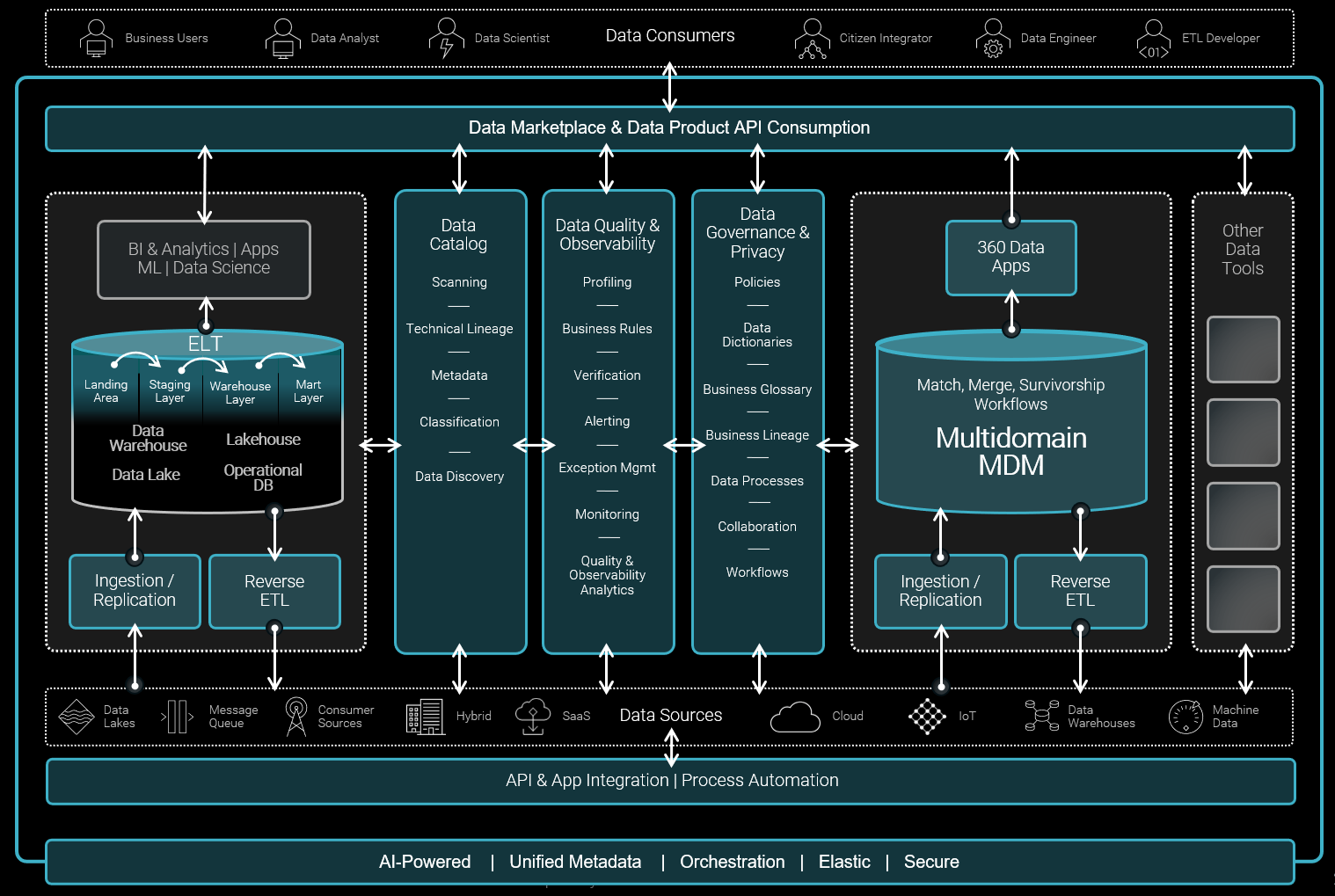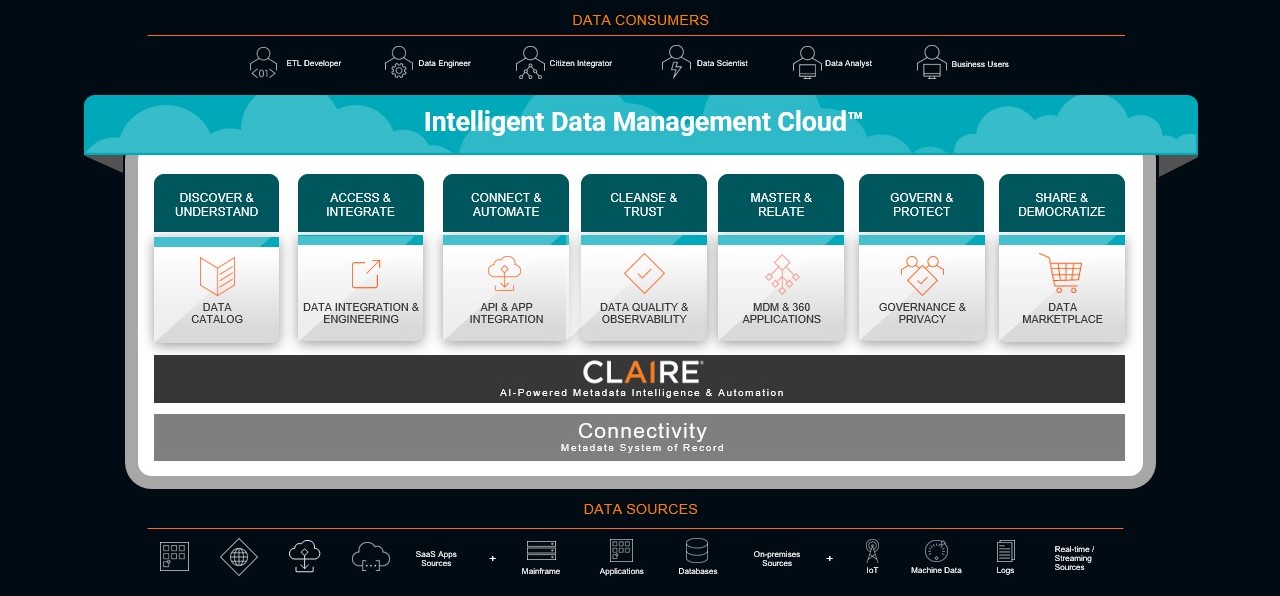How to Get Top Value from AI and Data with a Modern Data Architecture
Last Published: Sep 16, 2025 |
Table Of Contents
This blog is co-authored by Rameez Ghous, Sr. Manager, Technical Marketing.
Data stands at the cornerstone of effective decision-making, acting as a guide in an increasingly complex and dynamic business landscape. You need accurate and comprehensive data to gain valuable insights, understand trends and identify patterns to inform decision-making. By becoming data-driven, businesses can navigate uncertainties with confidence, optimize processes and seize opportunities with agility. According to Acumen Research, the world is expected to generate 181 zettabytes of data by 2025.1 But 47% of all data is dark data, on average, according to survey results from the Enterprise Strategy Group.2 This makes data intelligence a challenge due to the low usage of data for informed decision-making. That’s where artificial intelligence (AI) can help.
Insider Tip: Hear industry experts explore AI-focused modern data architectures by watching our on-demand AI & Architecture Summit
AI and Data: A Relationship with Endless Possibilities for a Smarter Future
According to Bloomberg, the generative AI market is poised to grow to $1.3 trillion over the next 10 years.3 In fact, current generative AI and other technologies have the potential to automate work activities that absorb 60% to 70% of employees’ time today.4 As AI algorithms learn from vast amounts of data, the significance of high-quality, diverse and abundant data cannot be understated.
Predictive and generative AI are revolutionizing the ability to use data to personalize and augment the customer experience for businesses, generate content to help marketers, suggest product development paths for product managers and speed up research and development for scientists. This is difficult to achieve through manual coding or processes, which drain time and effort, introduce potentially costly technical debt and do not scale in the long run.
But will AI algorithms be effective if the data they use is poor quality? And will businesses be confident in outputs generated by AI models that use bad data? According to CDO magazine, for AI, “poor data quality is public enemy number one.”5 Organizations need data management capabilities to overcome these data challenges. The data needs to be clean and trustworthy; consolidated and complete; accessible and available; and governed and managed.
To manage the ever-changing data landscape, organizations need to quickly build data pipelines, intelligently govern data and the ethical use of AI, master multiple domains and keep up with dynamic data quality issues. Unfortunately, traditional data management cannot perform at the speed and scale enterprises need without intelligence and automation. Hence, data management also needs AI.

Figure 1: AI and data are in a symbiotic relationship.
Why AI Needs Data Management
Imagine an organization is using AI to simplify its critical business needs, such as personalized marketing, supply chain optimization, fraud detection or product innovations. Now imagine that same organization is using AI algorithms to get insights and recommendations to make such critical business decisions based on bad data. This could be a recipe for disaster. For AI algorithms to be effective, you need data that is:
- High quality: So you have the capability to profile, standardize, cleanse, enrich and observe it.
- Available on-demand: So you can create data pipelines and have connectivity to the source.
- Mastered by domain: So you have a de-duplicated 360-degree view of different domains and can capture key relationships.
- Governed and secure: So it is safe to use and helps you stay compliant.
- Democratized and shared: So it is easy for data to be found and accessed to be self-serve.
This can be achieved through comprehensive data management capabilities implemented using a holistic approach to help enable AI algorithms to generate effective insights.
Why Data Management Needs AI
While we have established that AI needs data management to be effective, that is just one side of the story. Modern data ecosystems also need next-generation data management supported by AI-powered metadata intelligence and automation. Without this capability, it is difficult for data management to be agile and scalable.
But what does AI-powered data management mean?
Intelligence and automation can be incorporated into data management using AI copilots. Those copilots can understand and learn from unified metadata and automate:
- Data cataloging by classifying, labeling and relating datasets
- Data governance by enabling access to safe, relevant and compliant datasets
- Data engineering by quickly connecting and integrating data
- Data quality by identifying issues, and recommending, creating and executing rules to fix them
- Master data management by intelligently matching records
A natural language interface can be used to democratize data management and increase the productivity of data teams. This has virtually unlimited potential, by using generative AI to:
- Simplify data management through a text-to-platform interface to create rapid first drafts or automate repetitive tasks
- Deliver turbocharged data democratization and self-service to generate data pipelines, create new data assets and develop data quality rules using simple natural language prompts
- Provide an integrated data experience at the point of consumption to supply contextual data intelligence tailored to individual needs
Armed with these capabilities, data management can better address the demands of the fast-changing technological landscape and help AI initiatives succeed.
Why a Modern Data Architecture Is Fundamental to Bring Data and AI Together
This inherent dependency that data and AI have on each other depends on a solid data architecture to navigate the seemingly complex data ecosystem. Hence, modern data architectures such as data mesh and/or data fabric are well poised to comprehensively address this need.

Figure 2: Several building blocks make up a modern data architecture.
Modern data architectures are centered around key data management capabilities such as data cataloging; data quality and observability; data engineering; master data management; data governance and privacy; and data marketplace. They are also fueled by AI-powered unified metadata. These features together make modern data architectures able to support the needs of AI initiatives while making data management more accessible to users across the organization. In short, modern data architectures help enable the synergy between data management and AI to bring it to the fore.
How Informatica Brings Modern Data Architecture to Life
To implement a modern data architecture with your AI initiative to get critical business benefits, you need a data management solution that is scalable and robust while having the ability to navigate your complex data ecosystem. The Informatica Intelligent Data Management Cloud (IDMC), the industry’s first and most comprehensive AI-powered data management cloud, has the key data management capabilities data-driven organizations need. It also supports modern data architectures, such as data fabric and data mesh.

Figure 3: The Informatica Intelligent Data Management Cloud provides comprehensive AI-powered data management capabilities.
IDMC has an integrated combination of metadata and AI / machine learning (ML) with our AI engine, CLAIRE, to automate and provide intelligent support through CLAIRE copilot capabilities. IDMC will also offer a natural language-like interface to make data management accessible to virtually everyone, irrespective of skill level, through CLAIRE GPT. With IDMC, you can unlock the true potential of AI initiatives by bringing modern data architectures to life.
Next Steps
Looking to get more from your AI and data initiatives? There are several places you can start:
- To learn more about the relationship between AI and data management, be sure to check out the resources available in our on-demand AI & Architecture Summit.
- Learn more about the Informatica Intelligent Data Management Cloud, the industry’s first cloud-native, API-driven and microservices-based comprehensive data management cloud that can help with your data sharing and democratization journey.
- Visit our Experience Lounge to try interactive demos that show AI-driven data management in action.
1https://www.acumenresearchandconsulting.com/big-data-market
2https://www.erwin.com/docs/2022-esg-state-of-data-governance-and-empowerment-report-analyst-reports-30424.pdf
3https://www.bloomberg.com/company/press/generative-ai-to-become-a-1-3-trillion-market-by-2032-research-finds/
4https://www.mckinsey.com/capabilities/quantumblack/our-insights/the-state-of-ai-in-2023-generative-ais-breakout-year
5https://www.cdomagazine.tech/cdo_magazine/topics/opinion/for-ai-poor-data-quality-is-public-enemy-number-one/article_b37da6cc-c1be-11ed-9e38-378da069befc.html








